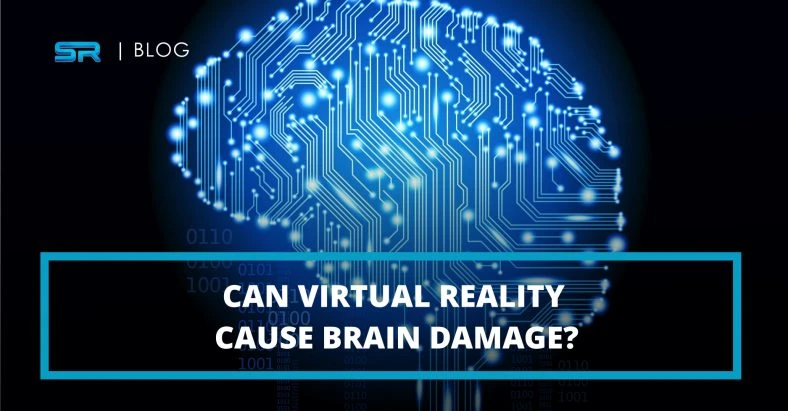Can Virtual Reality cause brain damage?

VR is a developing technology, which is differently applied in various areas. But modern research shows that VR affects the brains in a specific way. It is closely connected with human navigation and memory. The researchers find out that the brain cells work as the positioning system, forming the mental map of the environment and surrounding info. Virtual Reality may create only an artificial environment. In the virtual world, the brains don't create a mental map of the environments instead of real ones do. Is there an opportunity that VR activates the mental map as the real world? This fact is checked primarily on the experiment with rats. The purpose of the experiment was primarily to explore virtual reality side effects. But in this case, some factors impact it: smells, sounds, visuals, and other kinds of data. The researchers also found out that the brain can orientate on the surrounding whatever VR hi-tech or real-world is applied. The neurons of animals are under inspection while they practice Virtual Reality. The scientists record the signals from the hippocampus (memory, learning). The result demonstrates that Virtual Reality may learn the surrounding area, stimulating the brain neurons, but without a formation of the mental map. In the real world, brain cell activity and the creation of mental maps are two obligatory components of learning and memorizing. One also notice an interesting fact about the brain cells. The brain cells can track the steps of the animal and re-create the environment by its surrounding data. It is also proved that the brain is good at selecting and memorizing but in a very specific way. The key point lies in the approach of how to pick, to learn, or to keep in mind the received info. The smells and sounds and details of the area help to make this process easier.
Virtual Reality brain impact and mental effects
Virtual Reality is a very entertaining practice that can bring not only joy and immersion to the unreal world but serious health problems, mental disorders, and damage. There are some health risks that virtual reality makes, which lead to negative effects and consequences.
The first impact focuses on the fact Virtual Reality confuses the brain. It means that the visual organs (eyes) see one object or one surrounding area, but brain cells perceive and react to that differently. This leads to the confusion of consciousness and the brain, in general. It may continue for some hours. Perfectly, the places where the users spend time in VR don't mix up with real-life experience. In some cases, Virtual Reality practice has a colossal influence on memory creation in the brain. As a result, it may cause such damage and effects as hallucinations and illusions. Speaking about another reason to ruin the human well-being, the user often applies VR headsets so close to the visual organs as permitted for a long time and may easily damage the eyes by watching such screens. Dealing with the psychological aspect, Virtual Reality may make the users believe in what it demonstrates and seems real. This may provoke some psychological disorders, depending on what device is used. The neurons which are responsible for memory formation are constantly disordered during the Virtual Reality experience. This causes some problems in the procedure of memory creation. The last but the positive impact of Virtual Reality on brain performance is the treatment of some injuries and damages by the Virtual Reality sessions. Some unreal things and actions let the users' brains heal quickly. There is no scientific evidence that Virtual Reality can provoke constant brain damage to adults and kids. There are only some symptoms such as dizziness, depression, and collapse that appear while the VR experience. The technology is still new and requires investigation and research.
Brain consequences after Virtual Reality
VR sickness is an ordinary brain symptom for any user. It happens when human faces Virtual Reality and get feelings similar to motion sickness. The common symptoms are
- Headache
- Nausea
- Discomfort
- Depression
- Disorientation
- Drowsiness
The eyes and vestibular system are responsible for the info-, orientation-, and movement - transition to the brain. The function of the vestibular system is similar to the gyroscope for the human physical condition. When the eyes find out the 3D positioning in the current environment, the vestibular system can point out at the same time the body is moving or stable. The symptoms are caused by these organs because the eyes and vestibular system send different signals and info to the brain. The confusion of the brain happens immediately. After - Virtual Reality sadness happens when the user experiences a skill or activity and performs it perfectly, but when coming back to reality they receive a complex of emotions including sadness, depression, confusion, and anxiety. Everything around the client is less colorful and not ideal. In this case, it surely leads to a personal crisis. Looking at a digital display harms the user's eyesight. In this connection, Virtual Reality headsets are often applied in front of the eyes for some hours. This may cause eye strain and pain. The methods of safe use and control of some adjustments on the VR headset can reduce the harm. Speakers on the ears are also reasons for hearing problems. The main tip, in this case, is don't listen to high volume content in the VR headset. Almost all VR devices have strict warnings of use for particular layers of the population (elderly, pregnant, and disabled). One may notice that VR technology makes people sick in unpredictable ways. It is so hard to identify the reasons for negative Virtual Reality brain impact. That's why the usage of VR should be limited and controlled. The hi-tech is still developing with many innovations to implement. However, the further the progress goes, the harder the problems appear. A young generation is the first victim of modern hi-tech. VR may change some aspects of child/teen natural brain development. It is also required to prevent virtual reality dangers and establish the limits and specter of Virtual Reality content to be available, useful, and entertaining.
In the end, one can say that VR is a very promising technology, which may immerse in all spheres of life and make great achievements. But people should not forget about their health, specifically the brain, and take care of it attentively to feel good and enjoy the Virtual Reality possibilities with no harmful effects.

